The Intel Core i9-9900KS Review: The 5 GHz Consumer Special
by Dr. Ian Cutress on October 31, 2019 10:45 AM ESTCPU Performance: Encoding Tests
With the rise of streaming, vlogs, and video content as a whole, encoding and transcoding tests are becoming ever more important. Not only are more home users and gamers needing to convert video files into something more manageable, for streaming or archival purposes, but the servers that manage the output also manage around data and log files with compression and decompression. Our encoding tasks are focused around these important scenarios, with input from the community for the best implementation of real-world testing.
All of our benchmark results can also be found in our benchmark engine, Bench.
Handbrake 1.1.0: Streaming and Archival Video Transcoding
A popular open source tool, Handbrake is the anything-to-anything video conversion software that a number of people use as a reference point. The danger is always on version numbers and optimization, for example the latest versions of the software can take advantage of AVX-512 and OpenCL to accelerate certain types of transcoding and algorithms. The version we use here is a pure CPU play, with common transcoding variations.
We have split Handbrake up into several tests, using a Logitech C920 1080p60 native webcam recording (essentially a streamer recording), and convert them into two types of streaming formats and one for archival. The output settings used are:
- 720p60 at 6000 kbps constant bit rate, fast setting, high profile
- 1080p60 at 3500 kbps constant bit rate, faster setting, main profile
- 1080p60 HEVC at 3500 kbps variable bit rate, fast setting, main profile
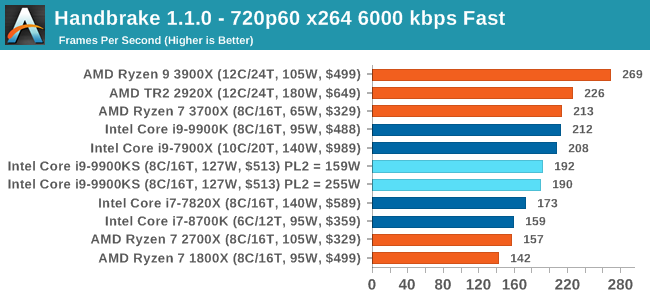
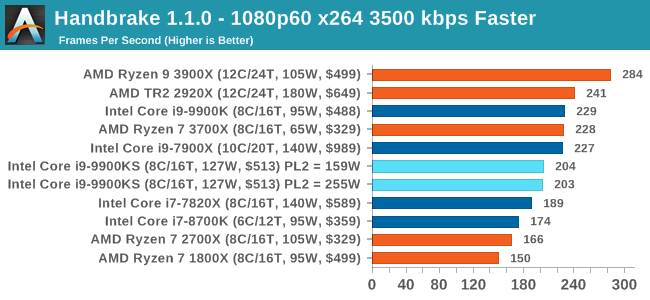
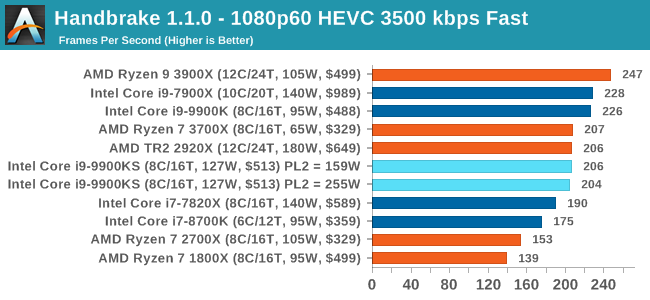
The 9900KS performed worse than our 9900K in our Handbrake tests, and we're not entirely sure why. It might be related to the regression we saw with DigiCortex.
7-zip v1805: Popular Open-Source Encoding Engine
Out of our compression/decompression tool tests, 7-zip is the most requested and comes with a built-in benchmark. For our test suite, we’ve pulled the latest version of the software and we run the benchmark from the command line, reporting the compression, decompression, and a combined score.
It is noted in this benchmark that the latest multi-die processors have very bi-modal performance between compression and decompression, performing well in one and badly in the other. There are also discussions around how the Windows Scheduler is implementing every thread. As we get more results, it will be interesting to see how this plays out.
Please note, if you plan to share out the Compression graph, please include the Decompression one. Otherwise you’re only presenting half a picture.
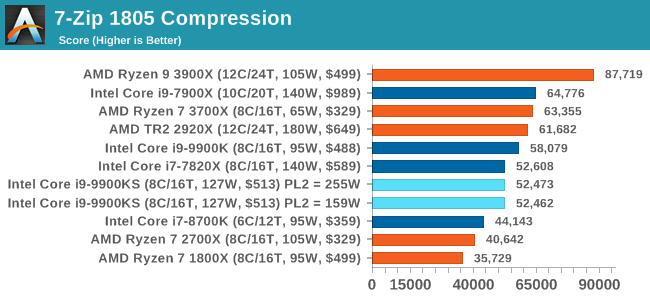
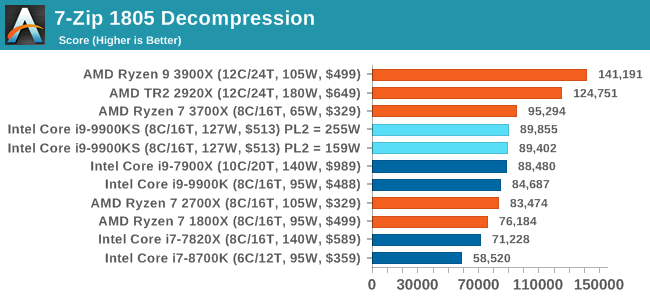
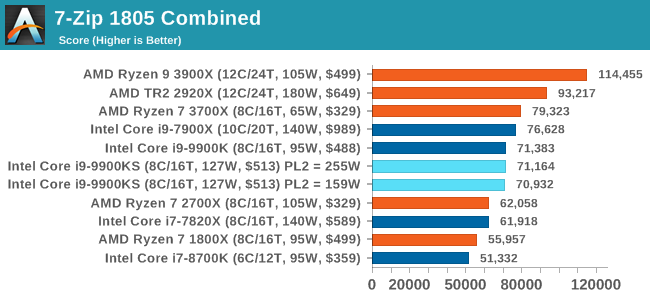
Both the 9900KS settings perform identically here, however the Compression test shows a performance regression compared to the standard 9900K. It does make me wonder if there are additional differences between the two chips (such as an internal clock).
WinRAR 5.60b3: Archiving Tool
My compression tool of choice is often WinRAR, having been one of the first tools a number of my generation used over two decades ago. The interface has not changed much, although the integration with Windows right click commands is always a plus. It has no in-built test, so we run a compression over a set directory containing over thirty 60-second video files and 2000 small web-based files at a normal compression rate.
WinRAR is variable threaded but also susceptible to caching, so in our test we run it 10 times and take the average of the last five, leaving the test purely for raw CPU compute performance.
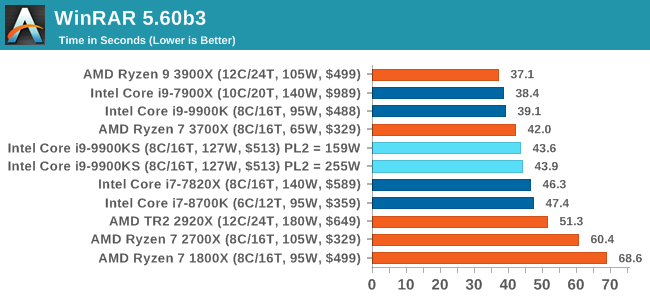
AES Encryption: File Security
A number of platforms, particularly mobile devices, are now offering encryption by default with file systems in order to protect the contents. Windows based devices have these options as well, often applied by BitLocker or third-party software. In our AES encryption test, we used the discontinued TrueCrypt for its built-in benchmark, which tests several encryption algorithms directly in memory.
The data we take for this test is the combined AES encrypt/decrypt performance, measured in gigabytes per second. The software does use AES commands for processors that offer hardware selection, however not AVX-512.
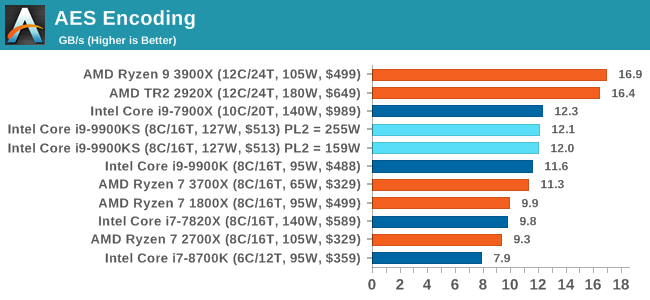










235 Comments
View All Comments
prophet001 - Monday, November 4, 2019 - link
I mainly play WoW and this would do a much better job than a 3900.Why does that tilt people?
Qasar - Monday, November 4, 2019 - link
you sure about that ??? i have 2 comps, both with a asus strix 1060 gaming OC, one with a 5930k, the other with an FX 8350, both max eye candy less AA ( 4x ) and AF ( 4x as well i think ) , and get about the same FPS. the 3900 will prob use less power over this.MDD1963 - Thursday, November 7, 2019 - link
I'm surprised an FX8350 can saturate a GTX1060, but, you maxing out the details and quality is the only reason the FX keeps up...; it's like saying the i5-8400 matches the 9900KS at 4k with a GTX1070. (Of course it does)eek2121 - Friday, November 1, 2019 - link
bwahahah, have you looked at the benchmarks? Enjoy your 3-5 extra FPS in gaming. ;)Korguz - Friday, November 1, 2019 - link
and the added power usage....Chaitanya - Thursday, October 31, 2019 - link
Also comes with only 1 year warranty. By special it really should mean mentally defective edition.amnesia0287 - Friday, November 8, 2019 - link
How many people ever actually use the warranty anyway lol.Samus - Friday, November 1, 2019 - link
Because it's drop-in compatible with the poor sap who isn't getting enough from the cheap Walmart i3 gaming PC they overpaid for.Unfortunately AMD just doesn't have the presence in retail to gloat that. Ironic, because traditionally AMD has had a superior upgrade path, keeping sockets longer and (provided motherboard vendors support their boards) new microcode support via BIOS updates.
josiasmat - Thursday, October 31, 2019 - link
I find it funny that in the past Intel CPUs were praised for their power efficiency over AMD ones. Now that AMD has a 65W CPU that is almost as fast as the reviewed CPU, it doesn't matter at all...Sivar - Thursday, October 31, 2019 - link
Indeed, the 7nm process is clearly a win here. That said, total platform power with Intel (9900KS excluded!) still tends to be lower very similar or even lower, in part due to the rather power-hungry 14nm AMD 570x chipset.470x-based AMD systems still win in most cases, but not by an extremely large amount.